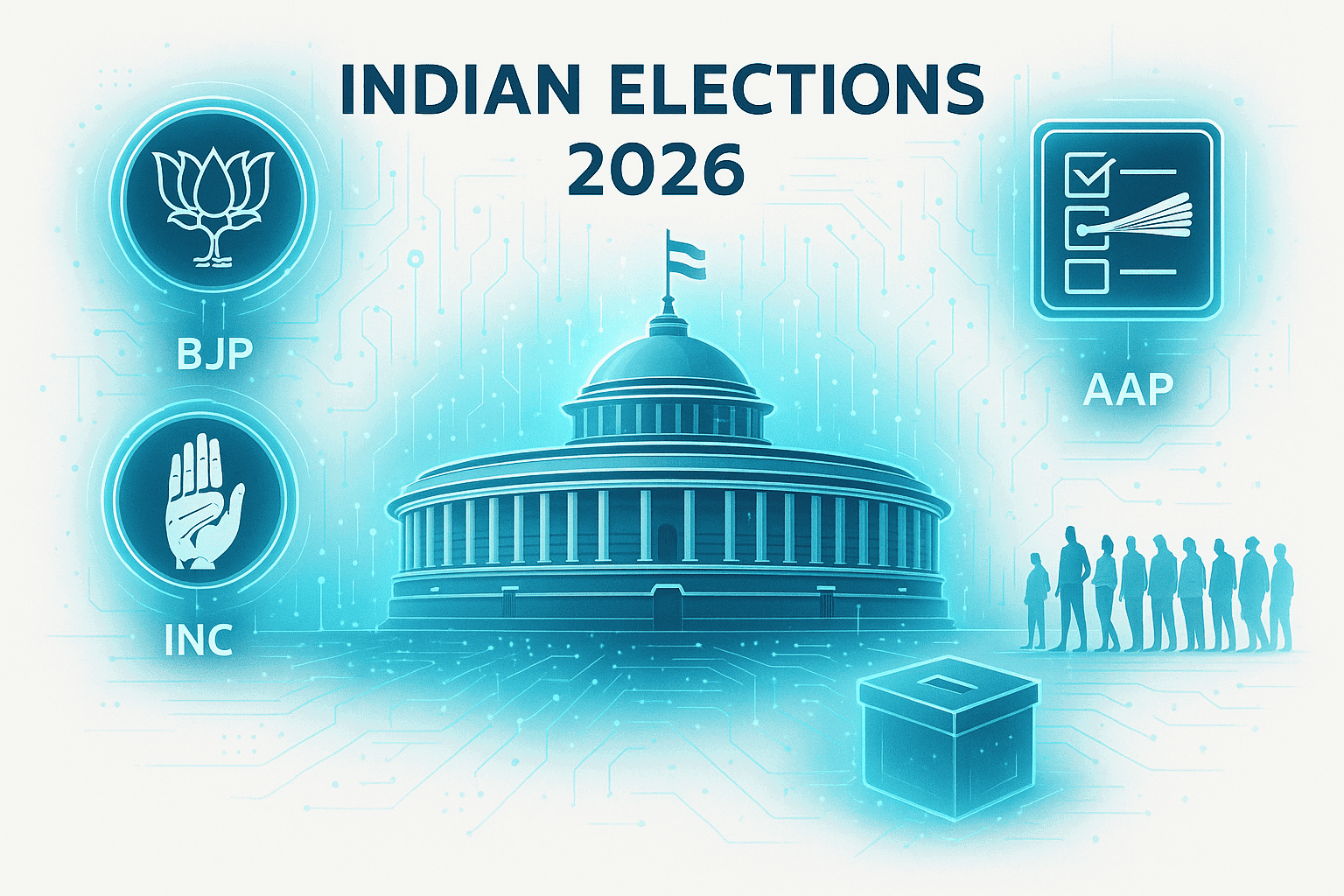The 2026 Indian elections are shaping up to be one of the most anticipated political events in recent history. With the potential to redefine power structures, political ideologies, and public sentiment, the upcoming elections in India may significantly impact the future of Indian politics. As the countdown begins, voters, analysts, and parties alike are asking: Will the 2026 elections change the face of Indian politics?
In this blog, we will explore this question in depth, examining key trends, emerging alliances, and predictions, while also analyzing the major political parties in India 2026, the dynamics of the Lok Sabha elections 2026, and the new voter expectations.
Understanding the Current Political Climate
Over the past decade, Indian politics has undergone major transitions. From the rise of nationalistic sentiments to the growth of regional powers, the Indian political landscape is more dynamic than ever. The BJP vs Congress 2026 narrative continues to dominate national debates, but emerging regional players and alliances may tip the scales.
Some crucial developments setting the stage for the India general elections 2026 include:
- Growing public dissatisfaction with inflation, unemployment, and infrastructure gaps.
- Digital empowerment and a young electorate demanding accountability.
- Regional leaders becoming national contenders.
Key Political Parties in India 2026
The major political parties in India 2026 likely to influence the elections are:
- Bharatiya Janata Party (BJP) – The current ruling party with a strong national base.
- Indian National Congress (INC) – Trying to reclaim its lost dominance through regional alliances and revamped campaigns.
- Aam Aadmi Party (AAP) – Gaining ground in urban areas through its governance model.
- Trinamool Congress (TMC), Samajwadi Party (SP), DMK, and others – Strong regional players eyeing national influence.
With the possibility of new political alliances in India, the traditional two-party narrative could shift dramatically.
2026 Elections Predictions: What Analysts Say
Political analysts are divided on whether the 2026 Indian elections will bring a major shift. Some predict a repeat of earlier trends with BJP retaining power, while others foresee a resurgence of the Congress or a coalition-led government.
Key predictions include:
- Higher voter turnout, especially from first-time voters and Gen Z.
- Technology-driven campaigns, with AI, data analytics, and social media playing a huge role.
- Polarization and regional issues influencing voter decisions more than national narratives.
Lok Sabha Elections 2026: New Factors at Play
The Lok Sabha elections 2026 will not be business as usual. Several new factors could change the game:
- Youth Voter Base: Over 65% of the Indian population is under 35. Their concerns include jobs, education, climate change, and digital freedom.
- Women Empowerment: With increased participation of women voters and candidates, gender-centric policies will be key.
- Digital Voting Awareness: From voter registration to campaign engagement, technology will play a crucial role.
- Post-COVID Expectations: Voters will expect stronger healthcare infrastructure and economic recovery strategies.
BJP vs Congress 2026: Same Battle, New Dynamics?
The traditional BJP vs Congress rivalry is far from over. However, the dynamics are evolving:
- BJP’s Strategy: Focus on nationalism, strong leadership, and welfare schemes like PM Awas Yojana, free rations, and infrastructure projects.
- Congress’ Revival: Revamping its image through youth leadership, strategic partnerships, and people-first policies.
However, this time, the battlefield might include powerful third-front alliances regional parties combining forces to counter both national giants.
Future of Indian Politics: What Lies Ahead?
The future of Indian politics post-2026 will depend heavily on:
- Coalition Stability: If no party wins a clear majority, coalition management will determine governance quality.
- Policy Over Populism: Voters may reward performance over promises.
- Decentralization: More power to state governments and local governance.
- Technological Governance: Use of AI in policymaking, digital ID systems, and smart governance tools.
If these factors play out as expected, the 2026 Indian elections could mark the beginning of a new political era.
New Political Alliances in India: A Game Changer?
As smaller parties gain confidence and national visibility, new political alliances in India are inevitable. These may include:
- Opposition Unity Fronts challenging the BJP in northern and western India.
- South Indian alliances emerging with influence beyond their states.
- Issue-based alliances around climate, education, and employment.
Such alliances could lead to a fragmented Lok Sabha, compelling parties to cooperate for stable governance.
2026 Indian Election News: What to Watch
To stay informed about the 2026 Indian election news, watch out for:
- State election results in 2025 early indicators of national sentiment.
- Campaign strategies launched by major parties and alliances.
- Manifestos, especially around youth employment, women safety, and digital economy.
- Debates and rallies to gauge public response.
The media, political influencers, and real-time polls will all provide continuous updates shaping public perception.
Suggested Poll
👉 Which political party do you think will win the 2026 Indian elections?
Participate and see how others are voting!
Conclusion: Will the 2026 Indian Elections Redefine Indian Politics?
Absolutely the 2026 Indian elections will likely bring significant change, whether it’s a shift in governance, emergence of new leaders, or a more aware and assertive electorate. While it’s too early to declare outcomes, one thing is clear: Indian democracy is entering a more participatory, tech-savvy, and youth-driven phase.The Lok Sabha elections 2026 will not just decide who rules India, but how India is governed. The nation watches with hope, skepticism, and curiosity.
